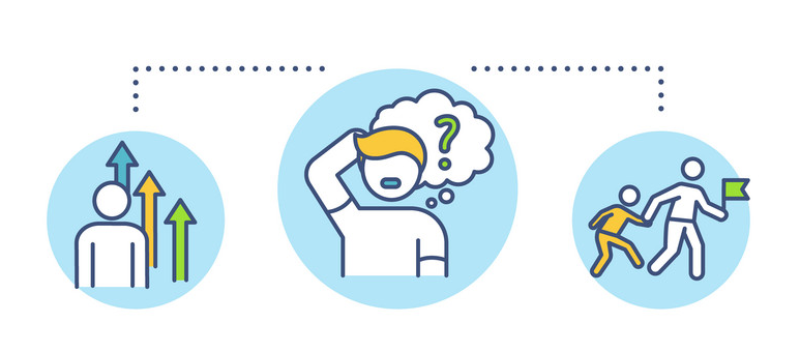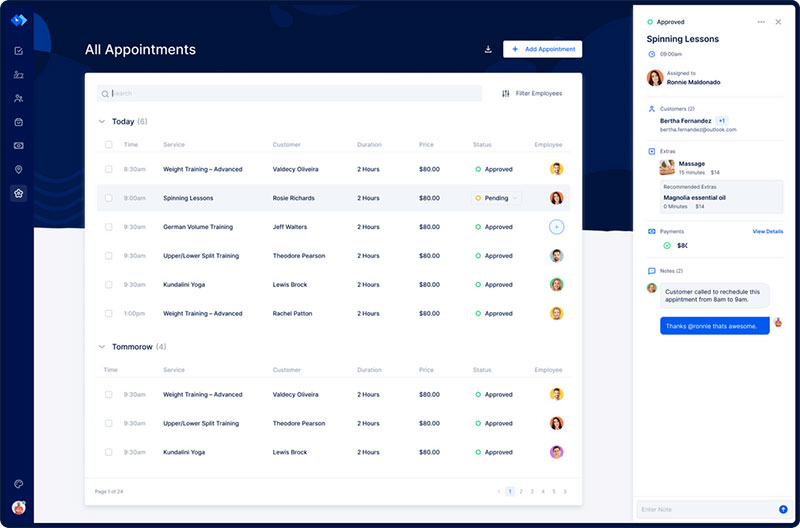Both mentors and mentees have specific expectations in mind when they embark on a professional mentoring relationship. Now and then they might experience frustration when expectations aren’t discussed and go unfulfilled.
No doubt, each mentoring relationship is as unique as the individuals involved. But there exist typical roles and functions that mentors and mentees need to carry out.
There isn’t a rulebook, so it’s essential that both parties clearly communicate their mentoring expectations.
What’s Expected of the Mentor?

Determine Mentor/Mentee Suitability
“Firing” someone is a messy job. As the mentor, you should take note of any red flags and carefully consider the benefits and drawbacks of a mentoring relationship before you commit.
If you need to discontinue a relationship that isn’t effective, meeting set goals, or constructive for the mentee consider when and how best to discontinue.
When both the mentor and mentee have concluded that the relationship is incompatible, they should
- review the initial expectations and available assistance
- assess alternatives that better suit the mentee
- designate another mentor as a suitable replacement
- keep in mind that co-mentoring and peer-mentoring are also possibilities
Define Roles and Functions
As is the norm with any relationship, a mentor and mentee should introduce themselves by emphasizing both their professional and personal identity. You, as the mentor, lead the way by sharing something career-related, like what you do and how you acquired your current position.
You should mention your educational background and the direction your career choices took.
It would be a good idea to share a few points about how you balance your work and life. You could talk about your partner/spouse, kids, and any talents or hobbies.
In this way, the mentee now has a better impression of with whom they’ll be involved. It’s your turn to ask questions and find out about the mentee’s career goals, professional history, and tidbits from their personal life.
Possess a Degree of Expertise
A good mentor can boast extensive experience in whatever area a mentee requires instruction and assistance. Ideally, you should be at a few positions above the mentee but still be able to identify with your mentee and their needs. It’s a bonus if you’re also a parent since you can provide suggestions for an effective work/life balance.
A mentee could learn how to progress in their profession while successfully fulfilling family obligations.
Be Accessible
A mentor with restricted available time might give a mentee the impression that they’re not important or relevant.
A mentor isn’t obligated to be available around the clock, but it’s vital that you be accessible for fundamental situations and issues affecting your mentee.
Have consideration for your mentee’s time, and as far as possible, schedule meetings around their requirements.
Don’t be rigid regarding the number of times you’re compelled to get together. It’s also respectful to avoid disturbances like phone calls or someone knocking at the door.
Communication and Scheduling Obligations
Solid communication is essential for a successful mentor relationship. A mentor gets the discussion rolling, defines the program’s objectives, and schedules mentoring sessions. You should provide suggestions, convey ideas and expectations, and give feedback and constructive criticism, and do it well.
A mentor works at developing the mentee’s trust. If your mentee feels comfortable, they will speak openly with you.
Define the Boundaries of the Mentorship Program
A casual friendship, therapy, formal tutoring, professional supervision—mentoring isn’t about any of that.
However, a friendship may develop from a mentoring arrangement. So, if you want to avoid any misunderstandings as a mentor, express clearly when you’re being a friend or serving as a mentor.
Provide Networking Opportunities and Resources
A seasoned mentor has established industry connections throughout their working life. Your mentee will expect to be introduced to industry peers who could support their career evolution. Without you, they may not have the opportunity to connect with such skilled professionals.
If you have been contracted from outside the company, you are able to open up a new and diverse pool of talent for your mentee. Such like-minded people will encourage the professional development of your mentee.
Resources are another tool that mentors offer their mentees during the mentoring program. You may suggest a particular book or encourage your mentee to check out an informative seminar or webinar. As a mentor could also point your mentee toward resources that are available within your organization.
Promote Introspection, Confidence, and Self-Sufficiency
Looking to reinforce your mentee’s confidence? Foster an atmosphere of understanding and spell out all boundaries and expectations.
Want your mentee to be self-sufficient? Set worthwhile goals. From the get-go, establish the direction they expect their career to take. Your goal should be to have your mentee fulfill their professional role successfully and independently.
Be honest when analyzing the direction your mentee’s career is heading. But let them know that, in the end, they have the final say when it comes to their professional growth.
Your mentorship success story starts with a scheduling app to streamline your calendar
Staying organized has never been easier.
You can now manage your business and grow your brand with a single, powerful software that keeps all of your appointments in line, your clients organized and your business booming.
Trafft is perfect for business owners who need to streamline their booking experience both for their staff and their clients.
Trafft handles everything for you, even sending automated email or SMS reminders to your clients. No-shows? Not anymore!
The Trafft booking software adapts to different industries for a blissful online booking experience and employee management.
Want to know more? Check out Trafft’s awesome features to see what you are missing.
Appreciate the Mentee’s Right to Privacy
One quality every successful mentor needs is trustworthiness. All mentees rely on their mentors to keep things confidential between them. You can render the whole mentoring experience fruitless if your mentee feels they cannot trust you.
When your mentee shares something with you, they may feel vulnerable and expect you to keep it private. Do not divulge any issues or worries with others in the company, even if it’s a manager or someone in authority.
Pay Attention to Growth and Evaluate
Sometimes, mentoring expectations can come across as unreasonable. Mentees could expect things that annoy and disappoint both parties. The following are a few things you are not obligated to do as a mentor:
- offer personal introductions to other industry professionals
- dedicate more time to mentoring than you’re capable of or performing functions for mentees to reach their targets
- acquire a job, promotion, or pay raise for your mentee
- act as a sounding board or therapist during sessions
- work with an apathetic mentee
- give only commendation or only criticism
What’s Expected of the Mentee?

Propel the Relationship
As the mentee, you could invite your mentor to get together with you, or propose some ideas to talk about during your meetings. Whatever you need, just ask whether by phone, email or when face-to-face.
Remember, you’re a mentee, not an employee. Mentoring relationships have the mentee’s goals as the foundation, so it’s up to you to determine what outcomes you want to achieve. You’ll be setting most of the timetable and ensuring the mentorship program moves forward. Your mentor is not a mind reader; communicate clearly about what you’re expecting from the partnership.
Be Straightforward When Setting Goals
Perhaps you’re not sure about your objectives before starting your mentoring relationship. But by the time you start the mentorship program, you should have those objectives clear in mind. By knowing what route you want to take, your mentor can determine if they’ll be able to assist you.
Your mentor can then establish guidance and advice that will be most beneficial for you. Therefore, it’s imperative that you clearly define the mentoring expectations you have for the duration of the program.
Be Teachable
You cannot enter a mentoring relationship without having the desire to learn. Focus on being courteous, taking the initiative, and being open to learning. Your mentor is ready to pass on their knowledge, but if you’re reluctant to learn those skills, you won’t have much success.
Try to get as involved as you can in the whole process. Mentoring programs should be a pleasant experience for those involved.
Fulfill Agreements
If you’ve made any goals regarding a specific action or made a commitment to your mentoring experience, stick to it.
Not only do you let down your mentor when you don’t keep your word, but you also hinder any progress in your training. Prepare beforehand for each meeting you’ve scheduled with your mentor, and carry out the various responsibilities to which you’ve committed during those meetings.
As an example, if you discuss some of the challenges you’ve come up against, make sure you listen to any helpful tips from your mentor, and work on each step before the next session. From reading an article to enrolling in a course to meeting up with a peer, dedicate yourself to whatever suggestions your mentor shares with you.
Request Feedback
Discussions with your mentor should involve practical feedback. And if it’s proving beneficial, don’t be afraid to ask for more.
On the other hand, constructive criticism might not seem productive at first. But if you’re interested in professional growth, then pay attention to the essential information such criticism holds.
Be ready to hear the feedback, whether negative or positive, and avoid being too sensitive and reactive to whatever is said. Rather, look for opportunities to thank your mentor for being honest with you. After all, they’re just as eager to see you get proactive about your development.
Mutual Mentoring Expectations
It’s important to note that there are certain expectations that involve both the mentor and the mentee in the program. Consider it to be a sort of contract in terms of the mentoring relationship.
- Be considerate of each other’s time. Stick to the schedule agreed upon, but if you need to cancel or reschedule a meeting, make sure to notify the other person without delay.
- Whatever discussions you have during your meetings should be kept in the strictest confidence. The quickest way to undo all the outstanding work established by the mentoring relationship is to share what the other person told you confidentially with employees in your company.
- It’s important that you touch base with one another as often as possible throughout the program. Use the time to review and assess how the relationship is benefiting both parties. Reevaluate periodically how often it is necessary to meet together and the status of your working harmony.
- Both participants should be respectful and tolerant of the fact that they have opposing opinions or methodologies. It’s neither wrong nor right and learning to see things from another point of view might help you grow in a professional capacity.
- Keep an open mind about the experience, and try to view every idea or suggestion from various perspectives.
- If you are transparent and sincere with each other during your meetings, you will create a trusting environment where both members can benefit.
FAQs about mentoring expectations
1. What is the role of a mentor and what are the expectations for their mentee?
A mentor’s responsibility is to assist their mentee in accomplishing their professional and personal objectives. This could entail giving guidance, exchanging stories, and assisting the mentee in picking up new abilities and information.
The mentee is expected to be open to criticism, eager to learn, and determined to take steps toward their objectives.
2. How often should a mentor and mentee meet, and what should be covered during those meetings?
Depending on their schedules and objectives, a mentor’s and a mentee’s meeting frequency can change. Typically, it is advised that meetings occur at least once every month. The individual requirements and objectives of the mentee will determine the format of these meetings.
These could involve sharing struggles and victories, talking about how far you’ve come toward your goals, and looking into new methods to learn and grow.
3. What level of commitment is expected from both the mentor and mentee?
A successful mentoring relationship should be the goal of both the mentor and the mentee. This entails open and honest communication, active participation in conversations, and respect for each other’s time and personal space.
Also, both sides must be dedicated to making plans, following through on them, and looking for ways to advance both personally and professionally.
4. What is the duration of a typical mentoring relationship and how is it determined?
Depending on the requirements and objectives of the mentee, the length of a mentoring relationship can change. While some mentoring relationships endure only a few months, others might go on for years.
Based on the precise goals that the mentee wishes to accomplish as well as the time and resources that the mentor is prepared to devote, the length of the relationship should be decided.
5. What are the expectations for confidentiality in a mentoring relationship?
A vital component of any mentoring relationship is confidentiality. All sensitive material disclosed during their meetings should be kept private and confidential by both the mentor and the mentee.
This can entail establishing boundaries for what information can be shared with others and exercising caution when storing and disseminating any sensitive data.
6. How is progress measured in a mentoring relationship and what are the expectations for feedback?
There are several ways to gauge progress in a mentoring relationship, including through feedback and frequent evaluations.
While the mentee is making progress toward their goals, the mentor should regularly check in with them and offer advice and support to help them get there. Also, the mentee should be receptive to criticism and ready to adjust in light of it.
7. What are the common goals of a mentoring relationship and how are they established?
The needs and objectives of the mentee will determine the mentoring relationship’s objectives. Typical objectives could be learning new things, getting better at something, or looking for prospects for job growth.
The mentor and mentee should have an open line of communication when setting these objectives, and they should be periodically evaluated and adjusted as progress is made.
8. How can a mentor help their mentee develop specific skills and knowledge?
By sharing their own experiences, offering advice, and showing support, a mentor can aid their mentee in developing particular skills and knowledge.
This may entail giving advice and recommendations for improvement, offering materials and equipment to assist the mentee in picking up new abilities, and providing chances for practical instruction and practice.
9. What are the expectations for communication between the mentor and mentee outside of formal meetings?
Each mentoring relationship must prioritize effective communication, and both the mentor and mentee must be dedicated to keeping in regular contact outside of scheduled appointments.
This may entail setting up regular phone or email check-ins, as well as being accessible to respond to inquiries and offer help as necessary.
To ensure that communication is fruitful and courteous, both parties should be clear about their expectations for it and should set boundaries.
10. What are the potential challenges that can arise in a mentoring relationship and how can they be addressed?
Lack of commitment, mismatched objectives, communication problems, and differences in working styles or personalities are just a few of the potential difficulties in a mentoring relationship that could arise.
Clear and open communication, realistic expectations, regular goal reviews, and a willingness to make adjustments as necessary are all ways to deal with these difficulties. It’s crucial that the mentor and mentee are both willing to work through obstacles together and, if necessary, seek outside assistance.
Above and Beyond Mentoring Expectations
Mentoring relationships can take on a variety of appearances. Some might prefer to keep them all about business, while others don’t mind mixing things up with business and a little bit of everyday life. Others flourish into a strong bond of friendship.
Despite all these affiliations, they all have one thing in common at the heart of the relationship—a mentor utilizes their professional and life experience to support a mentee looking to establish and develop themselves within their industry.
We suggest that you discuss and define your mentoring expectations from the start. This will help you to make the most of time spent together and answer any questions each participant may have about viewpoints and differing ideas. You don’t want to deal with one obstacle after another, so take the time to revise your expectations and turn your mentoring relationship into a worthwhile experience.
If you enjoyed reading this article about mentoring expectations, you should read these as well:
- The Many Types of Life Coaching Businesses You Can Start
- The Best Life Coaching Niches You Should Know About
- Social Media Marketing For Photographers: How To Do It Properly




